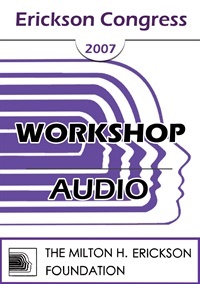IC07 Workshop 25 - Invisible Therapy - Michele Ritterman, PhD
- Average Rating:
- Not yet rated
- Topic Areas:
- Workshops | Couples Therapy | Utilization | Metaphors
- Categories:
- Erickson Congress | Erickson Congress 2007
- Faculty:
- Michele Ritterman
- Duration:
- 1:52:06
- Format:
- Audio Only
- Original Program Date:
- Dec 07, 2007
- License:
- Never Expires.
Description
Description:
In this workshop, you will learn how to recognize and track troublesome trances that couples trigger in one another. You will discover how the utilization of these stuck psychological states can act as the point for subtle and precise therapeutic interventions. With the use of metaphor, this technique is minimally invasive and elicits maximal receptivity from clients.
Educational Objectives:
- To describe how to track symptom inductions.
- Given a problem couple, describe a therapeutic intervention.
*Sessions may be edited for content and to preserve confidentiality*
Credits
Faculty

Michele Ritterman Related Seminars and Products
Michele Ritterman, PhD, is recognized as the Mother of the integration of hypnosis and family therapy, in her classic text: Using Hypnosis in Family Therapy (1982). One of Erickson’s leading students, she originated the concept of the symptom as a trance state that is suggested by people and social structures. From this basic concept that Erickson himself admired, she framed therapy as the production of COUNTER-INDUCTIONS, hypnotic SEQUENCES that impact the symptom trance. Her latest book The Tao of a Woman (2009) is a tool for us to carry with us to move from the symptom trance to the healing stance. Her book in progress is From Trance to Stance.
In 1991, Dr. Ritterman wrote the groundbreaking "Hope Under Siege: Terror and Family Support in Chile", which brought understandings of contextual/systemic trance inductions and trauma to the arena, long before the diagnosis of PTSD existed.


